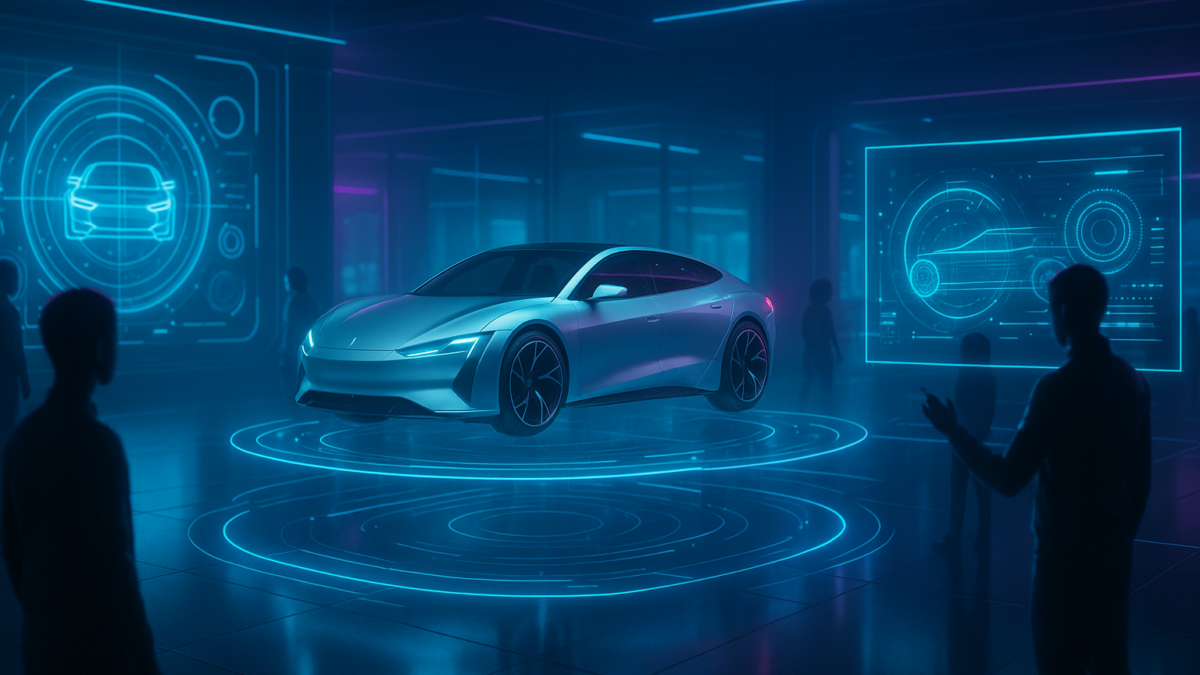Metaverse in Automobiles: Driving the Future of Mobility
Table of Contents
Introduction
As the lines between the physical and digital worlds continue to blur, the automotive industry is embracing one of the most transformative technologies of the decade—the metaverse.
What began as a concept for gaming and social interaction has rapidly evolved into a multi-industry revolution. Today, leading car manufacturers are leveraging metaverse platforms to reimagine everything from vehicle design and production to marketing, customer service, and even test drives.
Let’s explore how the metaverse is reshaping the automobile ecosystem—and what it means for the future of mobility.
What Is the Metaverse?
The metaverse is a collective, virtual space where users interact through avatars in real-time. Powered by technologies like virtual reality (VR), augmented reality (AR), blockchain, and digital twins, the metaverse enables immersive, lifelike experiences that bridge the physical and digital.
In the context of automobiles, the metaverse is creating opportunities to:
- Visualize car models in 3D
- Experience virtual showrooms
- Simulate test drives
- Collaborate on design and engineering
- Offer immersive brand storytelling
How Automotive Brands Are Using the Metaverse
Virtual Showrooms & Test Drives
Companies like Hyundai, BMW, and MG Motors have introduced meta verse-based showrooms where users can:
- Explore 3D models of vehicles
- Customize interiors and exteriors
- Book test drives—all from within a digital space
Platforms like Decentraland, Meta Horizon Worlds, and custom VR apps make it possible to interact with cars as if you’re physically present—driving deeper engagement and increasing lead conversion without needing a dealership visit.
Digital Twins for Design & Engineering
Automakers are creating digital twins of vehicles and production plants—high-fidelity virtual replicas used to:
- Simulate vehicle behavior
- Test aerodynamics and safety
- Streamline factory layouts and robotics
Brands like Nissan and Mercedes-Benz have used metaverse simulations to improve collaboration across global design teams in real time—cutting development time and cost.
Immersive Brand Experiences
Car brands are investing in virtual launches and storytelling through the metaverse. For example:
- Ferrari held a metaverse-based reveal of their new model with VR headsets and global audience participation.
- Porsche partnered with NFT platforms to offer branded virtual collectibles and experiences that connect with Gen Z.
These experiences aren’t just about novelty—they’re about building emotional resonance in digital-first consumers.
Customer Service & Training
The metaverse allows for virtual customer onboarding:
- Understanding vehicle features via VR
- Real-time Q&A with brand avatars
- AR-based guides for maintenance
It also helps brands train salespeople and technicians in simulated environments before they interact with real-world customers or vehicles.
Benefits of the Metaverse in Automotive Innovation
- Enhanced Customer Engagement: Immersive, interactive experiences deepen interest and drive emotional connections with the brand.
- Lower Operational Costs: Virtual prototyping and digital twin tech reduce R&D cycles and physical testing costs.
- Accessibility & Reach: Metaverse platforms allow brands to connect with global audiences without physical showrooms.
- Data-Driven Insights: Every interaction in the metaverse is trackable—helping brands understand customer preferences and behaviors in real-time.
Challenges to Consider
Despite its promise, the metaverse in automobiles faces a few hurdles:
- Hardware accessibility: VR/AR headsets are still niche consumer tech.
- Privacy concerns: Data collected through immersive environments must be securely managed.
- Interoperability: Seamless experiences across metaverse platforms are still evolving.
Yet, as 5G adoption, AI, and digital infrastructure improve, these challenges are likely to diminish.
What’s Next? The Road Ahead
The metaverse isn’t just a buzzword—it’s becoming a strategic pillar in automotive digital transformation.
We can expect:
- Subscription-based car services in the metaverse
- In-car VR experiences for passengers
- Metaverse-based financing and insurance models
- AR dashboards and navigation powered by real-world metaverse layers
As automakers continue to explore virtual space, the car buying and ownership journey will become more digital, immersive, and personalized than ever before.
Final Thoughts
From designing and testing to selling and servicing vehicles, the metaverse is unlocking next-gen capabilities in the automotive world. While it’s still early days, forward-thinking brands are already reaping the benefits of immersive customer journeys, efficient prototyping, and global reach.
Whether you’re an OEM, a dealer, or a mobility startup—the road to the future might just be virtual.
You May Also Like: The Metaverse in FinTech: Innovation Beyond Reality in 2025





